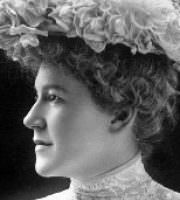by Robert Laurence Binyon
``Zeus, and ye Gods, that rule in heaven above,
Is there naught holy, or to your hard hearts dear?
Have ye forgotten utterly to love,
Or to be kind, in that untroubled sphere?
If aught ye cherish, still by that I pray,
Destroy the life that ye have cursed this day!
``No, ye are cold! The pains of tenderness
Must tease not your enjoyed tranquillity.
How should ye care to succour or to bless,
Who have not sorrowed and who cannot die?
Wise Gods, learn one thing from ephemeral breath;
They only love, who know the face of Death.
``When did ye ever come as men to earth
Save to bring plagues, war, misery, to us?
O vanity! We have smiled, yet know that birth
Looks but to death through passions piteous;
While calm ye live, and when these human seas
Wail in your ears, feel deepest your own ease.
``Yet envied ye my keener happiness,
That ye must quench it in such triple gloom?
For, by a mercy more than merciless,
Slaying my children in their guiltless bloom,
Me ye slew not, but suffered, as in scorn,
Accurst to linger in a land forlorn.
``Where are they now, those dead, that once were mine?
I saw them in their beauty, I thought them fair,
And in my pride dreamed they were half divine.
An idle boast I made, to my despair:
For in that hour they died, and I receive
A fate thrice bitterer, since I live to grieve.''
So, on the mountains, hapless Niobe,
With feverish longing and rebellion vain,
Bewailed herself, swift plunged in misery,
Bewailed her children, by dread deities slain;
Those jealous deities, whose bright shafts ne'er miss,
Phoebus, and his stern sister, Artemis.
Nine days those bodies of unhappy death
Lay in their beauty, by Ismenus flood;
For on sad Thebes Zeus breathed an heavy breath,
And men became as marble, where they stood.
Nine suns their unregarded splendour shed;
And still unburied lay those lovely dead.
But on the tenth day the high Gods took pity,
And in the fall of evening from their seats
In heaven, came down toward the silent city,
The still, forsaken ways, the unechoing streets:
And through the twilight heavenly faces shone.
But no man marvelled; all yet slumbered on.
The king sat, brooding in his shadowy halls,
His counsellors ranged round him. With fixed eyes,
Set brows, and steadfast gaze on the dim walls,
He sat amid a kingdom's mockeries;
And seemed revolving many a thought of gloom,
Though his mind slept, and knew not its own doom.
The Gods beheld unheeding, and went through,
And came to the stream's side, where slept the dead.
And while stars gathered in the lonely blue,
They buried them, with haste and nothing said;
Feeling, perchance, some shadow of human years,
And what in heaven is nearest unto tears.
So, their toil ended, the Gods passed again,
Through the deep night, to pale Olympus hill,
But in their passing breathed upon all men,
And loosed the heavy trance that held them chill.
Slowly night waned; the quiet dawn arose;
And Thebes awoke to daylight and her woes.
But Niobe, the mother desolate,
Enduring not to see her home forlorn,
To wander through the vacant halls, that late
Echoed with voice and laughter all the morn,
A homeless queen, went sorrowing o'er the hills,
Alone with the great burden of her ills.
There as she wept, a sleep was sealed on her;
Yet not such sleep as can in peace forget.
The strivings vain of hands that cannot stir,
And swelling passion, poisoned with regret,
And piercing memory, in their dark control
Possess with torment her imprisoned soul.
She, clouded in her marble, seeming cold,
Majestically dumb, augustly calm,
Yet feeling, through all bonds that round her fold,
A nameless fever that can find no balm,
A grief that kindles all her heart to fire,
The crying of a tyrannous desire,
Remains for ever mute, for ever still.
Thebes marvels, gazing at the stony thing,
And deems it lifeless as the barren hill,
To which the winds and rains no bloom can bring:
Yet under that calm front burns deeper woe
Than ever Thebes, with all her hearts, can know.
No hope she sees in any springtime now,
But it is buried in with the autumn leaves.
Yet, when day burns upon her weary brow,
Deadened to her deep pain, she scarcely grieves;
And, burdened with the glory of that great light,
Almost forgets it brought her children night.
But when the pale moon makes her splendour bare,
Terrible in the beauty of cold beams,
The radiance falls on the mute image there,
And Niobe awakens from her dreams.
Those subtle arrows search her soul, with pain
Tenfold more cruel from her children's bane.
Remembering their dead faces, she would sigh:
But the pure marble brooks no sound of grief.
She only lives to sorrow silently,
And, in despair, still hope some last relief.
The Gods are stern; and they to those long years
Ordained an immortality of tears.





